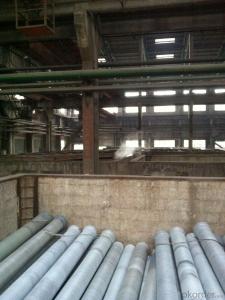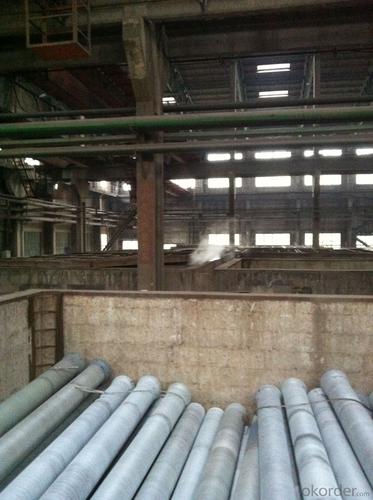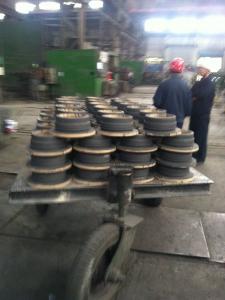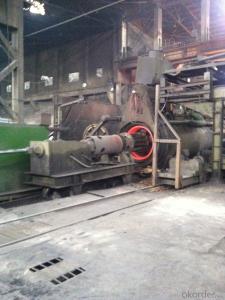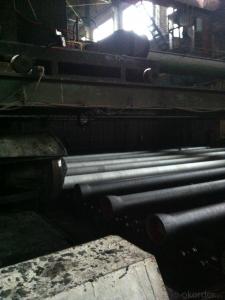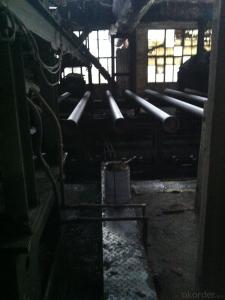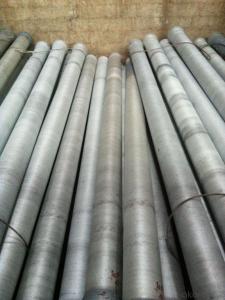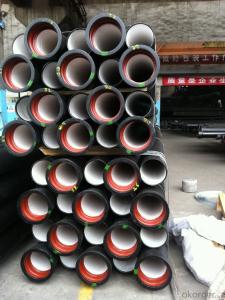DUCTILE IRON PIPE AND PIPE FITTINGS K9 CLASS DN450
- Loading Port:
- Tianjin
- Payment Terms:
- TT OR LC
- Min Order Qty:
- 21 pc
- Supply Capability:
- 3000 pc/month
OKorder Service Pledge
OKorder Financial Service
You Might Also Like
Material : Ductile Cast Iron
Size Range : DN 80mm to DN 2000mm
Unit Effective Length : 6m or 5.7m
Manufacture Standard: ISO 2531:1998/ EN 545:2006/EN 598:2007
Annual capacity : 200,000 tons
Coating Exterior: Zinc 130g/m2 according to ISO 8179-1 and bitumen coating 70 microns.
Cement Interior: Portland Cement/ High Alumina Cement/ Sulphate Resisting Cement Lining according to ISO 4179
Special requirements on external coating and internal lining can be applied
We also provide accessories such as SBR/EPDM rubber gaskets, lubricant paste, pipe caps, PE sleeves, etc.
Additional Parts:
Each pipe is strictly inspected according to related standard to ensure permanently high performance.
Easy Installation at site and service free for life
Long Service Lifespan
Quotation will arrive you within 24hours once we get your inquiry.
We guarantee offering you a competitive price.
A copy of original inspection reports of pipes will be offered after shipment.
Photos of loading process will be sent to the customer after shipment effect.
We will follow-up the delivery progress after shipment effect and update to the customer on weekly basis.
- Q: What is the average cost of ductile iron pipes?
- The average cost of ductile iron pipes can vary depending on factors such as the size, length, and supplier. However, on average, ductile iron pipes can range from $30 to $300 per linear foot.
- Q: Are ductile iron pipes suitable for use in wastewater pumping stations?
- Yes, ductile iron pipes are suitable for use in wastewater pumping stations. Ductile iron has excellent strength and durability, making it resistant to corrosion and capable of withstanding high pressure and heavy loads. It also has good flexibility, which helps prevent cracking or breaking under ground movements. Additionally, ductile iron pipes have a smooth internal surface, reducing friction and improving the flow of wastewater. Overall, these pipes are a reliable and long-lasting choice for wastewater pumping stations.
- Q: How do ductile iron pipes handle ground movement in earthquake-prone areas?
- In earthquake-prone areas, ductile iron pipes are highly regarded for their exceptional resistance to ground movement. These pipes are specifically designed to endure external forces, including seismic activities and shifting ground. The remarkable flexibility of ductile iron pipes allows them to effectively absorb and distribute the energy generated during ground movement. This flexibility is achieved through the unique composition of ductile iron, which contains nodular graphite in its microstructure. The presence of nodular graphite grants the pipe with ductility and resilience, enabling it to deform under stress without breaking. During an earthquake, when the ground begins to shift, ductile iron pipes have the capacity to adapt to the changing conditions. They can elongate, compress, and bend, thereby reducing the likelihood of pipe failure. This characteristic is of utmost importance in earthquake-prone areas, as it helps prevent catastrophic failures and water loss that may occur with more rigid pipe materials. Furthermore, ductile iron pipes possess a high level of joint integrity, further enhancing their ability to withstand ground movement during seismic events. The joints of these pipes are engineered to withstand lateral and angular movement, ensuring their integrity and preventing leaks. In addition to their inherent flexibility, ductile iron pipes are often installed using techniques that enhance their resistance to ground movement. Anchoring systems, such as thrust blocks and restraints, can be employed to secure the pipes and prevent excessive movement. These systems contribute to the stability of the pipeline network and further minimize the potential for damage during earthquakes. Overall, the combination of ductility, joint integrity, and anchoring systems make ductile iron pipes an exceedingly reliable choice for managing ground movement in earthquake-prone areas. They offer a durable and resilient solution that can withstand the challenges posed by seismic activities, guaranteeing a continuous water supply and minimizing the risk of infrastructure damage.
- Q: Can ductile iron pipes be used for potable water systems?
- Yes, ductile iron pipes can be used for potable water systems. Ductile iron is a type of iron that has been treated with magnesium to increase its strength and flexibility. These pipes are known for their durability, corrosion resistance, and ability to withstand high pressure. They are commonly used in water distribution systems, including for potable water supply. However, it is important to ensure that the ductile iron pipes used for potable water systems meet the necessary standards and regulations set by local authorities, such as NSF/ANSI 61 for drinking water system components. Regular maintenance and periodic testing are also essential to ensure the continued safety and quality of the potable water system.
- Q: How do ductile iron pipes handle cyclic loading in offshore applications?
- Ductile iron pipes possess remarkable strength and durability, rendering them suitable for a wide range of applications, including offshore usage. When it comes to dealing with cyclic loading in offshore settings, ductile iron pipes boast various characteristics that contribute to their exceptional performance. To begin with, ductile iron pipes demonstrate a high resistance to fatigue failure. Fatigue failure occurs when a material undergoes repeated stress cycles, leading to the initiation and propagation of cracks over time. Ductile iron pipes are specifically designed to endure cyclic loading without compromising their structural integrity. This is made possible by their inherent ductility and ability to effectively absorb and distribute stress. Furthermore, ductile iron pipes exhibit outstanding impact resistance. Offshore environments are prone to dynamic and unpredictable forces, such as waves and currents, which can exert sudden and intense loads on the pipes. The superior impact resistance of ductile iron allows it to withstand these forces without experiencing deformation or fractures, ensuring that the pipes remain intact and fully functional. Moreover, ductile iron pipes possess a unique microstructure that enables them to resist corrosion. Offshore applications expose pipes to harsh environmental conditions, including saltwater, which can accelerate the corrosion process. However, the protective graphite matrix present in ductile iron pipes acts as a barrier, preventing corrosive agents from reaching the underlying metal. As a result, the service life of the pipes is significantly prolonged. Additionally, ductile iron pipes have a high load-carrying capacity. In offshore applications, pipes often need to support heavy loads, such as those exerted by equipment, structures, or seabed settlements. The exceptional strength of ductile iron enables it to effectively bear these loads, ensuring the structural integrity and stability of the entire system. Lastly, ductile iron pipes offer ease of installation and maintenance. Their lightweight nature makes them easier to handle and transport during offshore operations. Furthermore, their corrosion resistance reduces the need for frequent maintenance, minimizing downtime and reducing the costs associated with repairs and replacements. In conclusion, ductile iron pipes exhibit excellent performance when it comes to handling cyclic loading in offshore applications. Their resistance to fatigue failure, impact resistance, corrosion resistance, high load-carrying capacity, and ease of installation and maintenance make them a dependable and efficient choice for offshore environments.
- Q: If the ductile iron pipe is broken, can we use rush repair?
- PE pipe repair section, as the name suggests, is a kind of used to repair the pipeline accessories. At present, the specifications of the repair section are: Phi 90, Phi 110, Phi 125, Phi 160, Phi 200, Phi 225, Phi 250, Phi 315 these specifications.
- Q: What pipe can be used to replace the cast iron pipe in the water supply? Thank you
- According to the casting method, it is divided into continuous cast iron pipe and centrifugal cast iron pipe, in which the centrifugal cast iron pipe is divided into sand mould and metal type two kinds. Divided into gray cast iron pipe and nodular cast iron pipe according to different material. According to the interface form, it is divided into flexible interface, flange interface, self anchored interface, rigid interface and so on. Among them, the flexible iron pipes rubber sealing ring; flange interface cast iron pipe flange fixed in the rubber pad, the flange gasket sealing; rigid interface cast iron pipe socket is large, straight pipe is inserted, sealed with cement, this technology has been basically eliminated.
- Q: What is the DN400 installation charge for ductile iron pipes?
- The wages paid under special circumstances: refers to the provisions of the state laws, regulations and policies, due to illness, injury, maternity leave, family planning leave, funeral leave, leave, leave, leave, regular shutdown, implementation of national or social obligations due to pay a certain percentage of wage hourly wage or salary when.
- Q: How does ductile iron pipe perform in extreme weather conditions?
- Ductile iron pipes are renowned for their exceptional performance in adverse weather conditions. These pipes demonstrate remarkable durability, resistance, and flexibility, making them suitable for enduring harsh weather such as extreme temperatures, heavy rainfall, snowfall, and even earthquakes. One of the notable characteristics of ductile iron is its capacity to withstand damage caused by freezing temperatures. Unlike other materials, ductile iron pipes possess a low coefficient of thermal expansion, enabling them to resist the expansion and contraction that occurs during freeze-thaw cycles without experiencing cracks or breaks. Consequently, these pipes remain intact and continue to function optimally even in extremely cold conditions. Furthermore, ductile iron pipes exhibit excellent resistance to corrosion, rendering them highly resilient to the corrosive effects of severe weather. They are shielded by a sturdy zinc coating, which acts as a barrier against rust and other forms of corrosion. This coating, in conjunction with the inherent strength of ductile iron, grants these pipes exceptional resistance to the corrosive effects of rain, snow, and moisture. Moreover, ductile iron pipes possess superior flexibility, allowing them to accommodate ground movement and seismic activity. In areas prone to earthquakes or soil shifting, these pipes can absorb stress and strain without fracturing, guaranteeing a continuous supply of water and sewage services even in the most challenging weather conditions. Overall, ductile iron pipes excel in extreme weather conditions due to their durability, resistance to freezing, corrosion, and flexibility. Their ability to withstand the elements ensures an uninterrupted supply of water and sewage systems, providing reliability and peace of mind to utility providers and communities, even in the most unforgiving environments.
- Q: How do ductile iron pipes perform in freeze-thaw cycles?
- Ductile iron pipes perform well in freeze-thaw cycles due to their high tensile strength and flexibility. Unlike brittle materials, ductile iron can withstand the expansion and contraction caused by freezing and thawing without cracking or breaking. This makes them a reliable choice for water and sewer systems in regions with harsh winter climates.
Send your message to us
DUCTILE IRON PIPE AND PIPE FITTINGS K9 CLASS DN450
- Loading Port:
- Tianjin
- Payment Terms:
- TT OR LC
- Min Order Qty:
- 21 pc
- Supply Capability:
- 3000 pc/month
OKorder Service Pledge
OKorder Financial Service
Similar products
Hot products
Hot Searches
Related keywords
